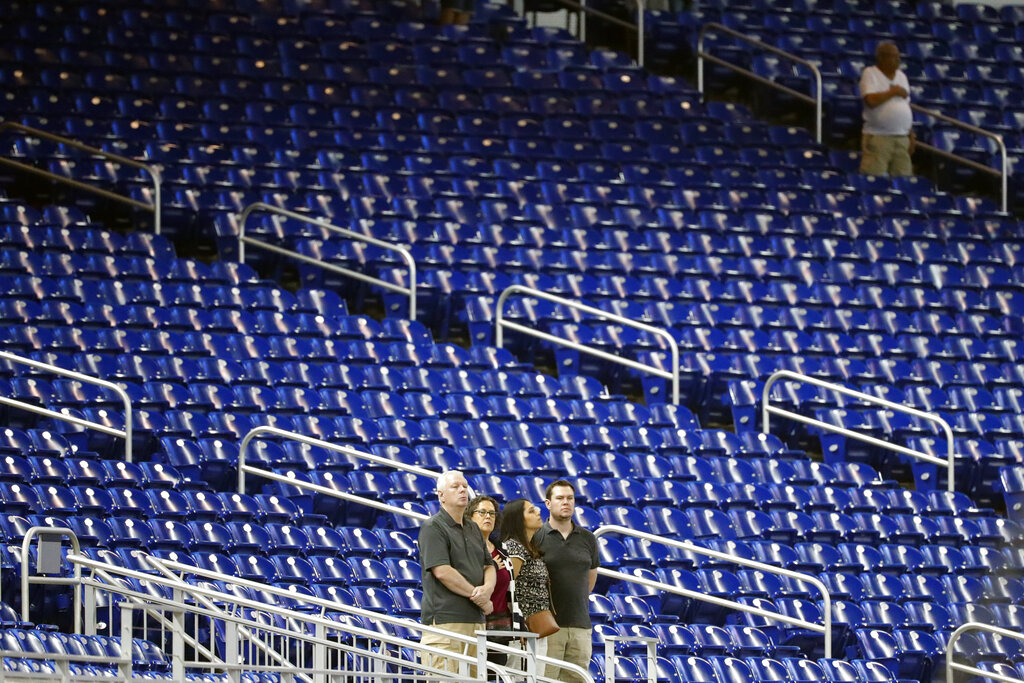
FILE – In this Monday, Sept. 9, 2019 file photo,Baseball fans stand among empty seats during the singing of the national anthem before a baseball game between the Miami Marlins and the Milwaukee Brewers in Miami. Major League Baseball’s average attendance dropped 1.7% this year for its fourth straight decline, and five of the six biggest drops were by teams with losing records. The 30 teams averaged 28,339, according to the commissioner’s office, down from 28,830 last year _ the first time the average was below 30,000 since 2003. (AP Photo/Wilfredo Lee, File)
NEW YORK — Major League Baseball’s average attendance dropped 1.7% this year for its fourth straight decline, and five of the six biggest drops were by teams with losing records.
Toronto, Seattle, San Francisco and Detroit combined for more than 1.8 million fewer tickets, and a 259-388 won-lost record.
The 30 teams averaged 28,339, according to the commissioner’s office, down from 28,830 last year _ the first time the average was below 30,000 since 2003. Total attendance of 68.5 million was down more than 5 million from 2015.
The players’ association maintains attendance has been hurt by an increase in rebuilding teams, which its members and staff label “tanking.”
“The willful failure of too many franchises to field competitive teams and put their best players on the field is unquestionably hurting our industry,” union head Tony Clark said last week.
Baseball Commissioner Rob Manfred says rebuilding is cyclical and attendance and record correlate in some markets but not all. He also points out the success of the sport in television ratings and an increase in minor league gates.
“We’re going to draw 68-plus million people at the big league level,” Manfred said, “another 41 million in minor league baseball — they’re actually going to be up. I’ll take 110 million people going to see the sport live. That’s a really, really awesome number in an environment where people have more and more and more alternatives to consume.”
Toronto had the biggest home attendance drop, falling 575,137 in a season in which the Blue Jays went 67-95 for their third straight losing season and most losses since 1980.
Seattle fell 507,769 as the Mariners went 68-94, their poorest record since 2011. San Francisco went down 448,425 and ended a streak of nine consecutive seasons at 3 million or more that coincided with three World Series titles. The Giants went 77-85 in their third straight losing season.
Detroit dropped 355,540 while going a big league-worst 47-114, the second-most losses in team history. The Tigers’ 1.5 million home attendance was their lowest since their 119-loss season in 2003.
Washington, which earned an NL wild card and beat Milwaukee to reach the Division Series, fell 269,823 following the departure of Bryce Harper to Philadelphia as a free agent.
Baltimore dropped 256,385 while going 54-108, and the Orioles’ 1.3 million fans at home were their fewest in a non-shortened season since 1978 at old Memorial Stadium.
In all, home attendance dropped for 14 of the 30 teams, although three of those teams fell by less than 100,000, Miami rose by 198 people to 811,302 while going 57-105 in Derek Jeter’s second season as chief executive.
Kansas City went down by 185,448 and fell below 1.5 million for the first time since 2006.
On the plus side, Philadelphia rose 569,297 after signing Harper and despite an 81-81 record finished above 2.7 million for the first time since 2013, when the Phillies started a streak of six straight losing seasons.
Minnesota went up 334,955 boosted by a 101-61 record, the second-most wins in team history, San Diego went up 227,863 after signing free agent slugger Manny Machado but skidded to a 70-92 record. The New York Mets went up 217,537 boosted by an August spurt and their first winning record since 2016.